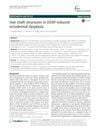Research Snippets: Dermatological Genetics and Conditions
July 2005
in “
British Journal of Dermatology
”
EDAR gene autosomal recessive hypohidrotic ectodermal dysplasia keratinocytes Propionibacterium acnes coproporphyrin III proinflammatory cytokines keratin 10 recessive epidermolytic hyperkeratosis Human endogenous retroviruses psoriatic lesions calcipotriol vitamin D3 analogue atrophic telogen effluvium HED P. acnes HERVs psoriasis vitamin D3 chemotherapy-induced hair loss

TLDR New gene mutations linked to skin conditions were found, bacteria and chemicals may worsen acne, a dog mutation could exist in humans, virus-like elements might be involved in psoriasis, and a vitamin D3 treatment doesn't prevent chemotherapy-related hair loss.
The document reports on various studies related to dermatological genetics and conditions. Novel mutations in the EDAR gene were identified as the cause of autosomal recessive hypohidrotic ectodermal dysplasia (HED) in two Pakistani families, which is significant for understanding the development of skin appendages. A study on keratinocytes showed that Propionibacterium acnes and coproporphyrin III induce proinflammatory cytokines, potentially contributing to inflammatory acne lesions. A novel keratin 10 splice-site mutation causing recessive epidermolytic hyperkeratosis was discovered in Norfolk terrier dogs, suggesting that similar recessive mutations may exist in humans. Human endogenous retroviruses (HERVs) were found to be expressed in psoriatic lesions, indicating a potential role in the disease's pathogenesis. Lastly, a study concluded that pretreatment with calcipotriol, a vitamin D3 analogue, did not protect against hair loss from chemotherapy, and the term 'atrophic telogen effluvium' was proposed to describe the hair loss pattern observed.




